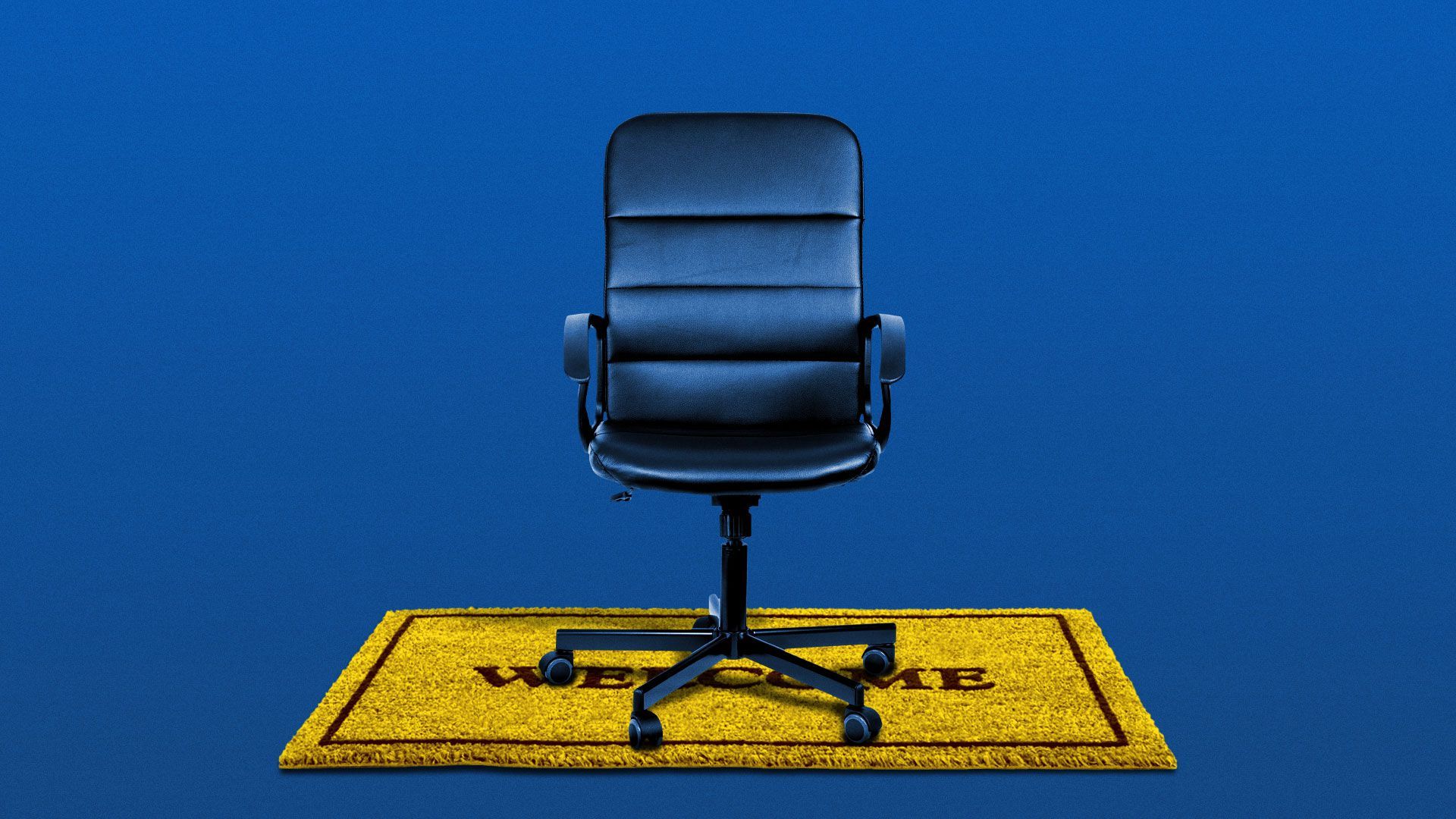| | | | | | | Presented By Deloitte | | | | Axios @Work | | By Erica Pandey ·Mar 24, 2021 | | Welcome back to @Work. Some exciting news: Next week's newsletter will be the final edition of @Work as you know it. We're evolving and expanding this newsletter to become something even bigger and better on a daily basis. - My coverage of workplace trends will continue on Axios.com in the interim — you can catch those stories by following me on Twitter @erica_pandey. And of course, you can reach me at erica@axios.com at any time.
I've got 1,486 words for you today — a 5½-minute read. We'll begin with... | | | | | | 1 big thing: The rise of the dreaded "workcation" |  | | | Illustration: Sarah Grillo/Axios | | | | The pandemic has popularized "workcations" — going on a vacation, but working while there. Why it matters: Just because work-from-anywhere means we can work on vacation doesn't mean we should. Experts warn that the pandemic's upending of work-life balance could drastically worsen burnout in the U.S. What's happening: 74% of Americans who are working from home said they'd consider taking a workcation, per Harris Poll data reported by Axios. "The kind of work that more and more people do doesn't fit neatly into time and place," says Michael Leiter, a professor of psychology at Acadia University. "It's not like you stop thinking about it when the clock hits 5pm." - Pandemic-era remote work has only accelerated the uncoupling of work from time and location, and that means the line between working and not working is increasingly blurry.
- And when work can happen anytime and anywhere, boundaries aren't automatically set. "You have to make that happen," Leiter says.
The big picture: Americans have always underused vacation days, and we're working even longer days during the pandemic. - American workers also work 50% more than those in Germany, France and Italy, per a National Bureau of Economic Research paper. But "there's no sign that the U.S. is more productive because of that," Leiter says. "It's not doing us any good to work all the time."
- In fact, Stanford researchers found that workplace stress costs the U.S. around $190 billion a year.
It's not just on individual workers to prioritize vacations, experts say. Companies and managers need to encourage their employees to unplug — especially during times of economic strife like the pandemic, when workers may be worried about job security and are reluctant to take time off. - Strategies include implementing company-wide days off and encouraging workers to take time off for mental health even if they don't have trips planned, Sabina Nawaz, a CEO coach and consultant, writes in the Harvard Business Review.
- "It starts at the top," says Darren Murph, head of remote work at GitLab, the world's largest all-remote company. "GitLab executives visibly take time off and will share in public channels. Disconnecting from work has to be celebrated at the highest level to set the tone for everyone else in the organization to recognize that recharging is supported and encouraged."
The bottom line: Vacations enrich your potential to contribute at work, Leiter says. When you stop thinking about work, "it just opens your mind in a whole different way. That distancing is part of how you recover your energy." - You can't reap any of those benefits on a workcation.
|     | | | | | | 2. Quantifying burnout |  | | | Illustration: Aïda Amer/Axios | | | | If you feel like remote work has increased the number of emails and meetings during the pandemic, you're right. The big picture: A new Microsoft study of the use of its office tools in the last year quantifies the digital overload workers have been experiencing. - People around the world spent 148% more time in meetings and sent 45% more chats in February 2021 than in February 2020, per an analysis of aggregate Microsoft Teams data.
- 40.6 billion more emails were sent through Microsoft Outlook in February 2021 than in February 2020.
Another troubling — and often overlooked — externality of telework has been the effect on Gen Z employees. And Microsoft's survey data shows that this cohort is struggling. - For workers who are fresh out of college, working remotely, away from peers and mentors, can be difficult and even hamper professional development.
- "Networking as someone early in their career has gotten so much more daunting since the move to fully remote work," Hannah McConnaughey, a product marketing manager at Microsoft, writes. "Without hallway conversations, chance encounters, and small talk over coffee, it's hard to feel connected even to my immediate team, much less build meaningful connections across the company."
- Per survey results, 16% of Gen Z workers reported struggling to get a word in during group calls and meetings during the pandemic, compared with 12% of millennials, 11% of Gen X workers and 9% of boomers.
|     | | | | | | 3. Lockdown silver lining for workers with disabilities |  | | | Illustration: Aïda Amer/Axios | | | | Pandemic-induced telework could open doors for America's workers with disabilities. The big picture: All sorts of hurdles — like getting to work if you're in a wheelchair or adjusting to office environments if you're a person with autism — are eliminated by remote work. This new future could be a more inclusive one for all Americans. The backdrop: Just 4 in 10 working-age adults with one or more disabilities are employed, per Brookings. - Education isn't a factor. The employment rate among college-educated adults with disabilities is 59%, compared with 69% for college-educated adults without disabilities.
What's happening: Drivers of this high rate include rampant discrimination in the hiring process as well as the fact that most cities' central business districts — where all the jobs are — are very inaccessible. - Everything from out-of-order elevators in the subway to closely packed tables at coffee shops and uneven sidewalks can make cities unnavigable, The Guardian reports.
- But when remote work took off during the pandemic, a lot of these barriers melted away.
Case in point: Kristen Parisi, a writer in New York who uses a wheelchair, has always wanted a remote job so she can focus on her work and not worry about her commute. But "working from home was looked at as a privilege, and none of the really desirable jobs were remote," she says. "Remote work was part of the discussion, but not a realistic part of the discussion." - The pandemic changed everything overnight. Now Parisi has a remote job and will never have to leave her home to go to work.
There are so many other examples of disabilities or chronic illnesses that can be addressed with telework, experts tell Axios. - Blind and deaf workers can do their jobs within their own environments without stressing about getting to the office.
- Employees with autism can choose to stay home if they'd rather avoid difficult office spaces.
- Workers with conditions like Crohn's disease or irritable bowel syndrome can work from their own areas with reliable access to a bathroom.
What to watch: Surveys show that most Americans want remote work to stick around after the pandemic is behind us. - But "watching some companies call their employees back breaks my heart," Parisi tells me. "My fear is that companies are going to have a very short memory and go back to the way things were."
Read the full story. |     | | | | | | A message from Deloitte | | Work Disrupted: How COVID-19 accelerated the future of work | | |  | | | | COVID-19 forced everyone to rapidly adapt to new ways of working without a playbook. Jeff Schwartz, a founding partner of Deloitte Consulting's Future of Work practice, explores opportunity, resilience and growth in the future of work. Learn how to navigate the disruption of work. | | | | | | 4. The remote revolution spreads beyond tech |  | | | Illustration: Eniola Odetunde/Axios | | | | At first, it was just the Silicon Valley tech giants embracing remote work forever. Now, firms in other industries are jumping on board. Driving the news: The Ford Motor Company is offering permanent telework as an option to all of its white-collar workers who are able to complete the tasks of their jobs remotely. That's about 30,000 of its 186,000 employees, per CBS. Why it matters: Ford is the largest non-tech employer to double down on remote work, and the company's move is yet another sign that the pandemic has changed the way America works for good. But Ford's move raises questions about "what the long-term effect will be of having classes of workers separated," says Jane Oates, president of WorkingNation, a nonprofit that raises awareness about the challenges facing U.S. workers, and a former Labor Department official. - "Will engineers be as effective if they don't interact with line workers?"
Meanwhile, some of the companies that were quick to support telework are now calling workers back to the office. - Microsoft is inviting 57,000 employees back to headquarters in Redmond, Washington, according to the New York Times. Of course, they can choose to continue working from home.
|     | | | | | | 5. Worthy of your time |  | | | Illustration: Aïda Amer/Axios | | | | Here come the weddings (Axios) - The colossal wedding business — already facing upheaval as marriage rates plummet — was left for dead by the pandemic. The effect crushed revenues for the lengthy list of love beneficiaries: vendors, florists, hotels, caterers, jewelers, makeup artists and more. Now, the traditional in-person wedding is plotting a comeback.
Employee surveillance software has staying power (Fast Company) - The pandemic normalized increased data collection in the workplace — from infrared temperature-reading cameras for essential workers to software that tracks keystrokes and search history for remote workers. Look for the surveillance to continue even after the pandemic is over, Fast Company's Alex Circei writes.
The debate over workplace culture at Goldman Sachs (New York Times) - A group of first-year analysts at Goldman Sachs has sparked conversations after compiling a slide deck detailing working conditions at the firm. They say they work around 100 hours a week and that the workplace is toxic due to micromanagement. The New York Times' DealBook newsletter notes that the analysts' complaints raise an interesting question: "In a highly paid industry, when do the hours worked become exploitative?"
The physical toll of the CEO gig (National Bureau of Economic Research) - A group of economists from the University of Illinois at Urbana-Champaign, UPenn, Yale and UC Berkeley are out with a new paper that uses data to examine the effect of job stress on the health of CEOs. For example, they find that the experience of responding to an industry-wide downturn shaves 1.5 years off a CEO's life.
|     | | | | | | 6. 1 fun thing: Weird job titles | | Elon Musk is calling himself the "Technoking of Tesla" these days. The ridiculousness of "technoking" made me go looking for other strange job titles. Coburg Banks, a U.K. recruiter, has a great list of the oddest ones they've actually seen in resumes. Some of my favorites: - Chick Sexer: This is the undisputed best one. It's someone who determines the sex of chickens.
- Wet Leisure Attendant: Come on, just say "lifeguard."
- Water Slide Tester: Sounds like a dream.
- Beverage Dissemination Officer: Let's stick with "bartender."
And of course, we all know and love the title "Genius," given to sales assistants and tech specialists at Apple's stores. |     | | | | | | A message from Deloitte | | How to navigate the accelerated future of work | | |  | | | | Work Disrupted, a new book by founding partner of Deloitte Consulting's Future of Work practice Jeff Schwartz, teaches readers how to: - Welcome AI.
- Build on the lessons from COVID-19.
- Value a diversity of work arrangements.
- Embrace new capabilities to lead teams and innovation.
Learn more. | | | | Thanks for reading! | | | | Axios thanks our partners for supporting our newsletters.
Sponsorship has no influence on editorial content. Axios, 3100 Clarendon Blvd, Suite 1300, Arlington VA 22201 | | | You received this email because you signed up for newsletters from Axios.
Change your preferences or unsubscribe here. | | | Was this email forwarded to you?
Sign up now to get Axios in your inbox. | | | | Follow Axios on social media:    | | | | | |









No comments:
Post a Comment